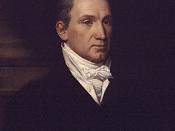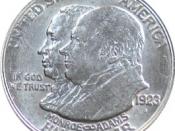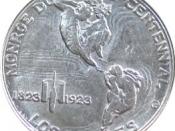Was the United States justified in declaring war in 1898? For:
â Monroe doctrine dictates US intervenes â be rid of european power â expansion â spanish detrimental to american trade to caribbean â would get rid of them (commercial
interests) â america rose as a world power
â sphere of influence â positive example of jingoism, popular war â relatively inexpensive â few casualties â see Mckinley's war message
Against: â Caused by propaganda â fought for purely imperialistic means
Causes: â Jingoism: an intense form of nationalism calling for aggressive foreign policy â Cuba wanted Spain's withdrawal or US as ally â Spain sent troops to crush revolt â Yellow journalism lead to Americans believing Spanish atrocities â Letter criticizing McKinley from Dupoy de Lome leaked â Maine anchored in Havana, Cuba exploded â yellow press accused spain â Mckinley's war message:
â Put end to barbiturates in Cuba â Protect lives of American citizens in Cuba â End injury to commerce â End menace to the peace
â Teller amendment: US wanted to restore peace in Cuba and allow it to become its own nation
Key terms:
â Jingoism: an intense form of nationalism calling for aggressive foreign policy â yellow journalism â teller amendment â McKinley's war message â sphere of influence â monroe doctrine â social darwinism â imperialism â Maine in Havana, Cuba
thesis: Because of the Monroe Doctrine and with a sense of imperialism and jingoism, the U.S. declared War on Spain in 1898. intro:
â seward's purchase of alaska â movement to purchase hawaii â imperialism of western hemishpere â Monroe Doctrine
body #1:cuban revolt/ monroe doctrine â cubans wanted spain out â wanted US as ally â monroe doctrine dictates that Europe is not permitted to colonized in the western
hemisphere body #2 :imperialism
â spain out of caribean â commercial interests â america becomes a world power â spreads sphere of influence
â introduce science, medicine, and technology â search for new markets â build a strong navy (Mahan's The Influence of Sea Power Upon history) â press would circulate more if stories about exotic places were published
Body #3 jingoism/ popular war â de Lome letter â Sinking of the Maine â people outraged at how the spanish were treating the cubans â the teller ammendment
rebuttal: yellow journalism: â hearst and pulitzer only published big stories that would be sure to sell â exaggerated â sinking of Maine wasn't as big a deal as people thought
Katie Rundzieher AP/IB US 2 9/12/14 Notebook Essay #1 Was the United States justified in declaring war in 1898?
Since the end of George Washington's presidency, westward expansion has been the
focus of foreign policy. By the late 1800's, however, the U.S. had expanded from the original
thirteen colonies on East coast of North America all the way to the Pacific ocean on the West.
After an industrial and economic boom, the U.S. became interested in spreading their sphere of
influence throughout the Western hemisphere. With the purchase of Alaska and the annexation
of Hawaii, it became time for the U.S. to move into the Caribbean currently occupied by the
Spanish and colonize countries such as Cuba and the Philippines. Because of the Monroe
Doctrine and with a sense of imperialism and jingoism, the U.S. declared War on Spain in 1898
in order to rise as a world power.
With the hope that Spain would retreat from the Caribbean, the U.S. would have the
chance to rise as a world power. Josiah Strong, an advocate for American Exceptionalism,
hoped to spread the American sphere of influence and introduce new sciences, medicine, and
technology to "uncivilized" nations. Additionally, businessmen and politicians were looking for
more marketing opportunities and because of Spanish misrule in Cuba, shipping routes through
the West Indies and the Gulf of Mexico had become compromised. The idea of Social
Darwinism had also become popular causing competition between imperialistic countries such
as the U.S., Great Britain and Spain. With all these prospects in mind, declaring war on Spain
would allow the U.S. to rise as an important world power.
In 1895, Cuban nationalists rose once again against the Spanish Government. Their goal
was to expel their Spanish oppressors and gain the U.S. as an ally. The Monroe Doctrine of 1823
dictates that Europe is prohibited from colonizing on the Western Hemisphere, and that it is the
duty of the U.S. to protect nations during times of crisis; therefore, the U.S. viewed it as an
obligation to protect Cuba and remove Spain from the Americas in order to fulfill the Monroe
Doctrine.
Jingoism, an intense form of nationalism calling for aggressive foreign policy, became
very apparent amongst the populace of the United States. Firstly, a letter from Spanish diplomat
Dupuy de Lome was leaked in Hearst's Journal. This letter was highly critical of President
McKinley and many people saw it as an insult towards national honor. Later in 1898 the U.S.
battleship, the Maine, exploded in the harbor of Havana, Cuba. The Spanish were accused of
causing this resulting in more unrest among American citizens. People were also outraged at
the oppressive and inhumane way the Spanish were ruling Cuba. Because Jingoism was so
rampant and war with Spain was so inevitable from a social standpoint, the McKinley
administration had no choice but to declare war. Consequently, the Teller Amendment was
enacted stating that the U.S. would restore the peace in Cuba and allow it to become its own
nation as well as protect the lives of Americans living in Cuba.
Some historians argue that the U.S. was not justified in declaring war on Spain due to
yellow journalism. Some newspapers such as Joseph Pulitzer's World and William Randolph
Hearst's Journal found that writing sensationalistic stories would increase circulation. They
would exaggerate stories such as the explosion of the Maine and the atrocities of Spanish rule in
Cuba causing outrage amongst the common American. This argument is invalid because it is
the U.S.' responsibility as a rising world power to protect smaller nations. Additionally the
expulsion of Spain from Latin America would allow the U.S. to build a stronger navy, grow
economically, and further fulfill Manifest Destiny.
In order for the U.S. to rise as a world power, grow economically, and fulfill their duty
dictated by the Monroe Doctrine, declaring war on Spain was imperative. Not only would the
Spanish- American war allow for further further growth as a nation, but would also achieve
Cuba's long term goal of becoming an independent nation. Due to senses of imperialism and
jingoism combined with obligations set by the Monroe Doctrine, the United States was justified in
declaring war with Spain.


